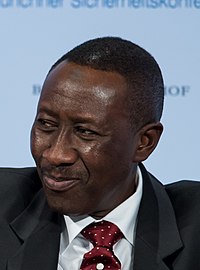The National Security Adviser (NSA), retired Maj.-Gen. Babagana Mongo, has called for effective collaboration and coordination in ensuring reconciliations the and stabilization of communities affected by insurgency.
Monguno, represented by the Coordinator, Centre for Counter-Terrorism, retired Rear Adm. Yaminu Musa, made the call at the closing of a 3-day seminar on the Rehabilitation of repentant Insurgents in the North-East, on Thursday in Abuja.
The seminar was organised by the Ministry of Humanitarian Affairs, Disaster Management and Social Development, Office of the National Security Adviser and the Nigerian Army Resource Centre.
He said the seminar was in furtherance of several ongoing efforts by government and other stakeholders geared towards addressing the challenges thrown forth by the menace of terrorism and violent extremism while adopting the whole-of-government and whole-of-society approaches.
According to him, it is essential to emphasis the important role of effective coordination to ensure synergy among key stakeholders to achieve the greater objective of building resilience and safer communities for all.
Monguno said that ONSA would continue to effectively engage with all stakeholders to ensure effective implementation of all programmes in conformity with its policy documents.
He gave assurance that ONSA was opened to partnership that would further strengthen the implementation of Disarmament, Deradicalisation and Reintegration (DDR) strategies considering its complexity and the fact that no single actor could plan and implement it alone.
“I believe this workshop has provided enormous for further collaborations that will bring about the realisation of the set objectives of the DDRR Programme.
“Let me assert here that significant successes have been achieved with the security efforts in the North-East and North-West.
“However, the shifting strategy of the terrorists and violent groups as well as the need to stabilise the affected communities create key challenges.
“The scale of atrocities that have been committed against communities create conditions for hate and reprisals against real or perceiveopportunitiesd perpetrators and in some cases victims.
“Justice whether retributive, transitional or transformative are major precursors and should be prioritised by key stakeholders in the management of DDRR activities.
“The cooperation of communities is imperative in the quest for government to consolidate on the gains of ongoing counter-terrorism operations,” he said.
NSA said that gradual resettlement and reintegration of affected communities was crucial to win the hearts and minds of the population’ to achieve sustainable reconciliation, reintegration and healing of wounds in the affected communities.
He added that DDRR efforts especially the non- traditional model could not effectively operate in isolation of Preventing and Countering Violent Extremism (PCVE).
According to him, perception of communities and the prevailing narratives about the violen whether ce is crucial in the efforts to restore peace.
“Opportunities for reconciliation and reintegration depend on the extent to which the groups and their communities of return are supported to rehabilitate, heal and reconcile.
“Reconciliation efforts should include detecting and analysing the perception of the communities,” he added.
The Director-General of NARC, retired Maj.-Gen. Garba Wahab, said that while talking about rehabilitation and reintegration of repentant terrorists, it was imperative to pay attention to the victims also.
Wahab said that the government should balance its desire to encourage the insurgents to drop their arms and addressing the lights of the victims who had suffered both as individuals and as communities.
He said the seminar was designed to look at the totality of issues bothering on to treat the repentant insurgents and the victims who had suffered and lost loved ones due to the actions of insurgents.
He also said there was need to provide a legal framework that would look at possibly of what to do with people who had committed offence but then needed to be rehabilitated.
